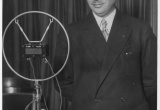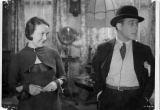The Sound Film Succeeds Thanks to Revue Stars
In the mid-1920s, when the Dutch feature film was as good as dead, variety shows and cabaret were thriving. Revue stars such as Louis Davids, Heintje Davids, Lou Bandy, Willy Derby and Fien de la Mar were packing them in and audiences adored them. The Netherlands might not have produced any film stars, but it certainly brought forth a good number of variety entertainers. When the Dutch sound film was introduced, the film world capitalised on the populariy of these revue stars.
Dutch cabaret draws crowds
It all started in 1929, when film company Hofstadfilm produced a number of one-acts with well-known actors such as Lou Bandy and Willy Derby. Optical sound recording was not yet possible in the Netherlands, so the sound for the one-acts was played synchronously via a gramophone record during the performance. Content-wise, there wasn’t much to these short films – they are simply variety shows captured on film. Shorter than four minutes in length, they were used as ‘merely’ intermezzos in film programmes. Nevertheless, they were snapped up like hotcakes by exhibitors because Dutch audiences were avidly interested in watching ‘their’ stars; this was especially true in the farthest corners of the country, where the performers never played.
Variety in vignette
The Dutch film industry didn’t make any effort to make film stars of the variety entertainers. Quite the contrary, they let the actors do what the public expected of them. In the popular feature film De Jantjes, Heintje Davids and Sylvain Poons sing ‘Draaien’ and ‘Omdat ik zoveel van je hou’ – songs that would not be out of place in a variety show – and Fien de la Mar sings a sentimental song on a set made to resemble a pub. Especially notable in the film is a scene with Louis Davids that’s copied from a variety show.
Each of these scenes are individual vignettes, none of which contributes to any sort of narrative or character.
In the films Het meisje met de blauwe hoed and Het leven is niet zoo kwaad, the immensely popular revue performer Lou Bandy also did what he had been doing for years – and what had made him so well loved – singing and making jokes.
A Dutch alternative
In the short production Het Nederlandsche cabaretalbum there are six famous revue stars: Jopie Koopman, Sylvain Poons, Heintje Davids, Louis Davids, Fien de la Mar and Albert de Booy. The film was made by Nationaal Film as an alternative to all the musical ‘shorts’ from the United States that flooded the market at the time. In this film, the actors perform a short variety skit and end with a song.
The lyrics for the songs were written by the well-known Jacques van Tol and the music was written by Tuschinski cinema’s resident conductor, Max Tak. Het Nederlandsche cabaretalbum was a sing-along film and was shown as the opening programme in cinemas. The lyrics ran under the image as the film played. In those days, singing along with the film to the accompaniment of the cinema’s resident organist was extremely popular and Cor Steyn, one of the country’s best-loved organists, even had his own film: Nederland zingt met Cor Steyn.
Although Dutch critics had mixed opinions regarding the contributions of the revue stars, there was no mistaking the fact that they revived the Dutch film industry – even if, according to the critics, they didn’t improve the quality of Dutch film.
more information
If you are looking for more material from our collection, please contact
Ms. Leenke Ripmeester
sales@eyefilm.nl
phone +31 (0)20 5891 426
mobile +31 (0)6 4118 9635

